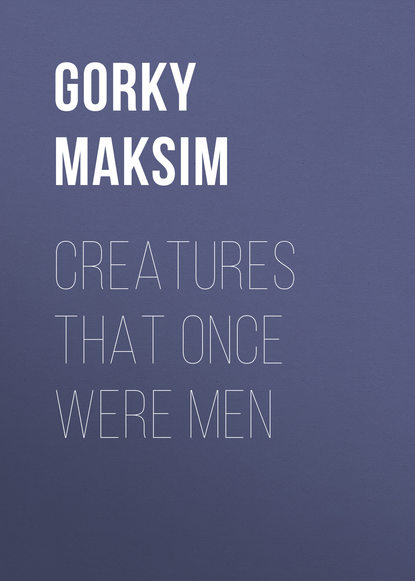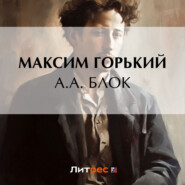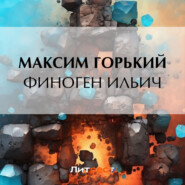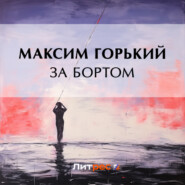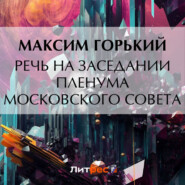По всем вопросам обращайтесь на: info@litportal.ru
(©) 2003-2025.
✖
Creatures That Once Were Men
Настройки чтения
Размер шрифта
Высота строк
Поля
The wind tore a rent in the clouds and through the gap peeped blue bits of sky, with one or two stars. Reflected in the frolicking sea, these stars danced on the waves, vanishing and shining out again.
"More to the right!" said Chelkash. "Soon we shall be there.
Well, well! It's over. A haul that's worth it! See here.
One night, and I've made five hundred roubles! Eh? What do you say to that?"
"Five hundred?" Gavrilo, drawled, incredulously, but he was seared at once, and quickly asked, prodding the bundle in the boat with his foot. "Why, what sort of thing may this be?"
"That's silk. A costly thing. All that, if one sold it for its value, would fetch a thousand. But I sell cheap. Is that smart business?"
"I sa – ay?" Gavrilo drawled dubiously. "If only I'd all that!" be sighed, recalling all at once the village, his poor little bit of land, his poverty, his mother, and all that was so far away and so near his heart; for the sake of which he bad gone to seek work, for the sake of which he had suffered such agonies that night. A flood of memories came back to him of his village, running down the steep slope to the river and losing itself in a whole forest of birch trees, willows, and mountain-ashes. These memories breathed something warm into him and cheered him up. "Ah, it would be grand!" he sighed mournfully.
"To be sure! I expect you'd bolt home by the railway!
And wouldn't the girls make love to you at home, aye, aye!
You could choose which you liked! You'd build yourself a house.
No, the money, maybe, would hardly be enough for a house."
"That's true – it wouldn't do for a house. Wood's dear down our way."
"Well, never mind. You'd mend up the old one. How about a horse?
Have you got one?"
"A horse? Yes, I have, but a wretched old thing it is."
"Well, then, you'd have a horse. A first-rate horse!
A cow – sheep – fowls of all sorts. Eh?"
"Don't talk of it! If I only could! Oh, Lord! What a life I should have!"
"Aye, mate, your life would be first-rate. I know something about such things. I had a home of my own once. My father was one of the richest in the village."
Chelkash rowed slowly. The boat danced on the waves that sportively splashed over its edge; it scarcely moved forward on the dark sea; which frolicked more and more gayly. The two men were dreaming, rocked on the water, and pensively looking around them. Chelkash had turned Gavrilo's thoughts to his village with the aim of encouraging and reassuring him.
At first he had talked grinning sceptically to himself under his mustaches, but afterward, as he replied to his companion and reminded him of the joys of a peasant's life, which he had so long ago wearied of, had forgotten, and only now recalled, he was gradually carried away, and, instead of questioning the peasant youth about his village and its doings, unconsciously he dropped into describing it himself:
"The great thing in the peasant's life, mate, is its freedom! You're your own master. You've your own home – worth a farthing, maybe – but it's yours! You've your own land – only a handful the whole of it – but it's yours! Hens of your own, eggs, apples of your own! You're king on your own land! And then the regularity. You get up in the morning, you've work to do, in the spring one sort, in the summer another, in the autumn, in the winter – different again. Wherever you go, you've home to come back to! It's snug! There's peace! You're a king! Aren't you really?" Chelkash concluded enthusiastically his long reckoning of the peasant's advantages and privileges, forgetting, somehow, his duties.
Gavrilo looked at him with curiosity, and he, too, warmed to the subject. During this conversation he had succeeded in forgetting with whom he had to deal, and he saw in his companion a peasant like himself – cemented to the soil for ever by the sweat of generations, and bound to it by the recollections of childhood – who had wilfully broken loose from it and from its cares, and was bearing the inevitable punishment for this abandonment.
"That's true, brother! Ah, how true it is! Look at you, now, what you've become away from the land! Aha! The land, brother, is like a mother, you can't forget it for long."
Chelkash awaked from his reverie. He felt that scalding irritation in his chest, which always came as soon as his pride, the pride of the reckless vagrant, was touched by anyone, and especially by one who was of no value in his eyes.
"His tongue's set wagging!" he said savagely, "you thought, maybe, I said all that in earnest. Never fear!"
"But, you strange fellow!" – Gavrilo began, overawed again —
"Was I speaking of you? Why, there's lots like you!
Ah, what a lot of unlucky people among the people! Wanderers – "
"Take the oars, you sea-calf!" Chelkash commanded briefly, for some reason holding back a whole torrent of furious abuse, which surged up into his throat.
They changed places again, and Chelkash, as he crept across the boat to the stern, felt an intense desire to give Gavrilo a kick that would send him flying into the water, and at the same time could not pluck up courage to look him in the face.
The brief conversation dropped, but now Gavrilo's silence even was eloquent of the country to Chelkash. He recalled the past, and forgot to steer the boat, which was turned by the current and floated away out to sea. The waves seemed to understand that this boat had missed its way, and played lightly with it, tossing it higher and higher, and kindling their gay blue light under its oars. While before Chelkash's eyes floated pictures of the past, the far past, separated from the present by the whole barrier of eleven years of vagrant life.
He saw himself a child, his village, his mother, a red-cheeked plump woman, with kindly gray eyes, his father, a red-bearded giant with a stern face. He saw himself betrothed, and saw his wife, black-eyed Anfisa, with her long hair, plump, mild, and good-humored; again himself a handsome soldier in the Guards; again his father, gray now and bent with toil, and his mother wrinkled and bowed to the ground; he saw, too, the picture of his welcome in the village when he returned from the service; saw how proud his father was before all the village of his Grigory, the mustached, stalwart soldier, so smart and handsome. Memory, the scourge of the unhappy, gives life to the very stones of the past, and even into the poison drunk in old days pours drops of honey, so as to confound a man with his mistakes and, by making him love the past, rob him of hope for the future.
Chelkash felt a rush of the softening, caressing air of home, bringing back to him the tender words of his mother and the weighty utterances of the venerable peasant, his father; many a forgotten sound and many a lush smell of mother-earth, freshly thawing, freshly ploughed, and freshly covered with the emerald silk of the corn. And he felt crushed, lost, pitiful, and solitary, torn up and cast out for ever from that life which had distilled the very blood that flowed in his veins.
"Hey! but where are we going?" Gavrilo asked suddenly.
Chelkash started and looked round with the uneasy look of a bird of prey.
"Ah, the devil's taken the boat! No matter. Row a bit harder.
We'll be there directly."
"You were dreaming?" Gavrilo inquired, smiling.
Chelkash looked searchingly at him. The youth had completely regained his composure; he was calm, cheerful and even seemed somehow triumphant. He was very young, all his life lay before him. And he knew nothing. That was bad. Maybe the earth would keep hold of him. As these thoughts flashed through his head, Chelkash felt still more mournful, and to Gavrilo he jerked out sullenly:
"I'm tired. And it rocks, too."
"It does rock, that's true. But now, I suppose, we shan't get caught with this?" Gavrilo shoved the bale with his foot.
"No. You can be easy. I shall hand it over directly and get the money. Oh, yes!"
"Five hundred?"
"Not less, I dare say."
"I say – that's a sum! If I, poor wretch, had that!
Ah, I'd have a fine time with it."
"On your land?"
"To be sure! Why, I'd be off – "
And Gravilo floated off into day dreams. Chelkash seemed crushed. His mustaches drooped, his right side was soaked by the splashing of the waves, his eyes looked sunken and had lost their brightness. He was a pitiable and depressed figure. All that bird-of-prey look in his figure seemed somehow eclipsed under a humiliated moodiness, that showed itself in the very folds of his dirty shirt.
"More to the right!" said Chelkash. "Soon we shall be there.
Well, well! It's over. A haul that's worth it! See here.
One night, and I've made five hundred roubles! Eh? What do you say to that?"
"Five hundred?" Gavrilo, drawled, incredulously, but he was seared at once, and quickly asked, prodding the bundle in the boat with his foot. "Why, what sort of thing may this be?"
"That's silk. A costly thing. All that, if one sold it for its value, would fetch a thousand. But I sell cheap. Is that smart business?"
"I sa – ay?" Gavrilo drawled dubiously. "If only I'd all that!" be sighed, recalling all at once the village, his poor little bit of land, his poverty, his mother, and all that was so far away and so near his heart; for the sake of which he bad gone to seek work, for the sake of which he had suffered such agonies that night. A flood of memories came back to him of his village, running down the steep slope to the river and losing itself in a whole forest of birch trees, willows, and mountain-ashes. These memories breathed something warm into him and cheered him up. "Ah, it would be grand!" he sighed mournfully.
"To be sure! I expect you'd bolt home by the railway!
And wouldn't the girls make love to you at home, aye, aye!
You could choose which you liked! You'd build yourself a house.
No, the money, maybe, would hardly be enough for a house."
"That's true – it wouldn't do for a house. Wood's dear down our way."
"Well, never mind. You'd mend up the old one. How about a horse?
Have you got one?"
"A horse? Yes, I have, but a wretched old thing it is."
"Well, then, you'd have a horse. A first-rate horse!
A cow – sheep – fowls of all sorts. Eh?"
"Don't talk of it! If I only could! Oh, Lord! What a life I should have!"
"Aye, mate, your life would be first-rate. I know something about such things. I had a home of my own once. My father was one of the richest in the village."
Chelkash rowed slowly. The boat danced on the waves that sportively splashed over its edge; it scarcely moved forward on the dark sea; which frolicked more and more gayly. The two men were dreaming, rocked on the water, and pensively looking around them. Chelkash had turned Gavrilo's thoughts to his village with the aim of encouraging and reassuring him.
At first he had talked grinning sceptically to himself under his mustaches, but afterward, as he replied to his companion and reminded him of the joys of a peasant's life, which he had so long ago wearied of, had forgotten, and only now recalled, he was gradually carried away, and, instead of questioning the peasant youth about his village and its doings, unconsciously he dropped into describing it himself:
"The great thing in the peasant's life, mate, is its freedom! You're your own master. You've your own home – worth a farthing, maybe – but it's yours! You've your own land – only a handful the whole of it – but it's yours! Hens of your own, eggs, apples of your own! You're king on your own land! And then the regularity. You get up in the morning, you've work to do, in the spring one sort, in the summer another, in the autumn, in the winter – different again. Wherever you go, you've home to come back to! It's snug! There's peace! You're a king! Aren't you really?" Chelkash concluded enthusiastically his long reckoning of the peasant's advantages and privileges, forgetting, somehow, his duties.
Gavrilo looked at him with curiosity, and he, too, warmed to the subject. During this conversation he had succeeded in forgetting with whom he had to deal, and he saw in his companion a peasant like himself – cemented to the soil for ever by the sweat of generations, and bound to it by the recollections of childhood – who had wilfully broken loose from it and from its cares, and was bearing the inevitable punishment for this abandonment.
"That's true, brother! Ah, how true it is! Look at you, now, what you've become away from the land! Aha! The land, brother, is like a mother, you can't forget it for long."
Chelkash awaked from his reverie. He felt that scalding irritation in his chest, which always came as soon as his pride, the pride of the reckless vagrant, was touched by anyone, and especially by one who was of no value in his eyes.
"His tongue's set wagging!" he said savagely, "you thought, maybe, I said all that in earnest. Never fear!"
"But, you strange fellow!" – Gavrilo began, overawed again —
"Was I speaking of you? Why, there's lots like you!
Ah, what a lot of unlucky people among the people! Wanderers – "
"Take the oars, you sea-calf!" Chelkash commanded briefly, for some reason holding back a whole torrent of furious abuse, which surged up into his throat.
They changed places again, and Chelkash, as he crept across the boat to the stern, felt an intense desire to give Gavrilo a kick that would send him flying into the water, and at the same time could not pluck up courage to look him in the face.
The brief conversation dropped, but now Gavrilo's silence even was eloquent of the country to Chelkash. He recalled the past, and forgot to steer the boat, which was turned by the current and floated away out to sea. The waves seemed to understand that this boat had missed its way, and played lightly with it, tossing it higher and higher, and kindling their gay blue light under its oars. While before Chelkash's eyes floated pictures of the past, the far past, separated from the present by the whole barrier of eleven years of vagrant life.
He saw himself a child, his village, his mother, a red-cheeked plump woman, with kindly gray eyes, his father, a red-bearded giant with a stern face. He saw himself betrothed, and saw his wife, black-eyed Anfisa, with her long hair, plump, mild, and good-humored; again himself a handsome soldier in the Guards; again his father, gray now and bent with toil, and his mother wrinkled and bowed to the ground; he saw, too, the picture of his welcome in the village when he returned from the service; saw how proud his father was before all the village of his Grigory, the mustached, stalwart soldier, so smart and handsome. Memory, the scourge of the unhappy, gives life to the very stones of the past, and even into the poison drunk in old days pours drops of honey, so as to confound a man with his mistakes and, by making him love the past, rob him of hope for the future.
Chelkash felt a rush of the softening, caressing air of home, bringing back to him the tender words of his mother and the weighty utterances of the venerable peasant, his father; many a forgotten sound and many a lush smell of mother-earth, freshly thawing, freshly ploughed, and freshly covered with the emerald silk of the corn. And he felt crushed, lost, pitiful, and solitary, torn up and cast out for ever from that life which had distilled the very blood that flowed in his veins.
"Hey! but where are we going?" Gavrilo asked suddenly.
Chelkash started and looked round with the uneasy look of a bird of prey.
"Ah, the devil's taken the boat! No matter. Row a bit harder.
We'll be there directly."
"You were dreaming?" Gavrilo inquired, smiling.
Chelkash looked searchingly at him. The youth had completely regained his composure; he was calm, cheerful and even seemed somehow triumphant. He was very young, all his life lay before him. And he knew nothing. That was bad. Maybe the earth would keep hold of him. As these thoughts flashed through his head, Chelkash felt still more mournful, and to Gavrilo he jerked out sullenly:
"I'm tired. And it rocks, too."
"It does rock, that's true. But now, I suppose, we shan't get caught with this?" Gavrilo shoved the bale with his foot.
"No. You can be easy. I shall hand it over directly and get the money. Oh, yes!"
"Five hundred?"
"Not less, I dare say."
"I say – that's a sum! If I, poor wretch, had that!
Ah, I'd have a fine time with it."
"On your land?"
"To be sure! Why, I'd be off – "
And Gravilo floated off into day dreams. Chelkash seemed crushed. His mustaches drooped, his right side was soaked by the splashing of the waves, his eyes looked sunken and had lost their brightness. He was a pitiable and depressed figure. All that bird-of-prey look in his figure seemed somehow eclipsed under a humiliated moodiness, that showed itself in the very folds of his dirty shirt.





